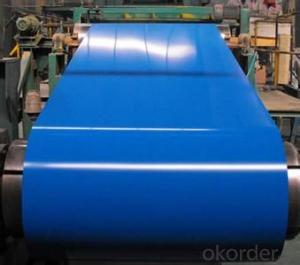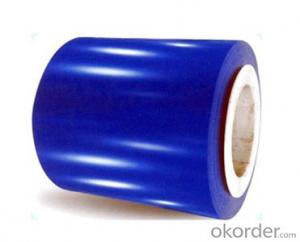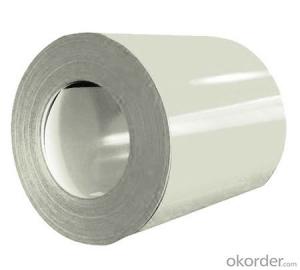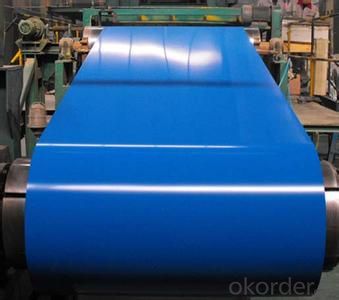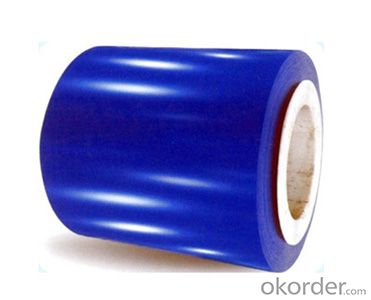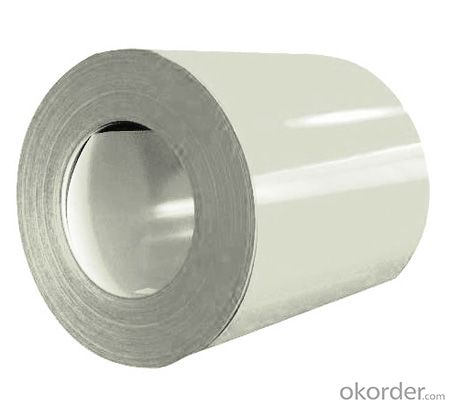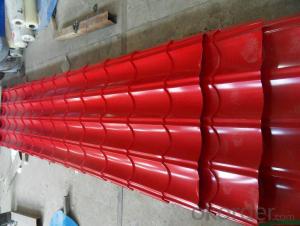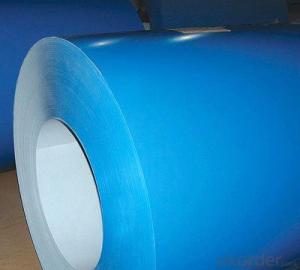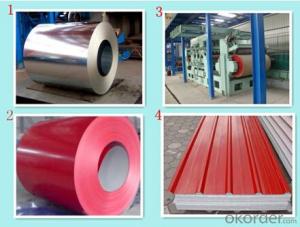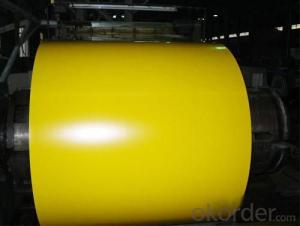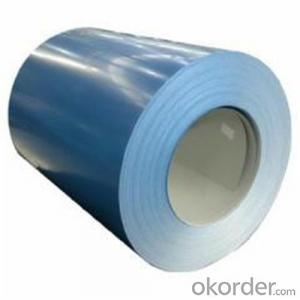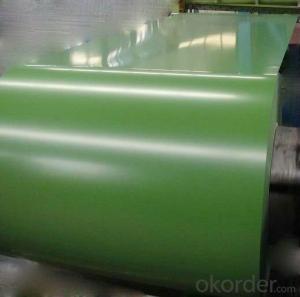Prepainted Galvanized Steel Coil Good Quality for Roofing-CGCC
- Loading Port:
- China main port
- Payment Terms:
- TT or LC
- Min Order Qty:
- 50 m.t.
- Supply Capability:
- 15000 m.t./month
OKorder Service Pledge
OKorder Financial Service
You Might Also Like
Prepainted Galvanized Steel Coil Good Quality for Roofing-CGCC
1. Structure of Prepainted Galvanized steel Coil :
•Prepainted galvanized steel qualified with excellent decorative ,formability ,corrosion resistance ,coating adhesion ,can keep for a long time as well as maintain fresh color .For color coated steel sheet can obtain good economic benefit by steel belt wood ,efficient in construction and save energy ,prevent pollution etc. Which is an ideal material for manufacturing board.
2.Main Features of Prepainted Galvanized steel Coil:
• Excellent process capability
• Smooth and flat surface
• Workability, durability
• Excellent heat resistance performance
• High strength
• Good formability
• Good visual effect
3.Prepainted Galvanized steel Coil Images
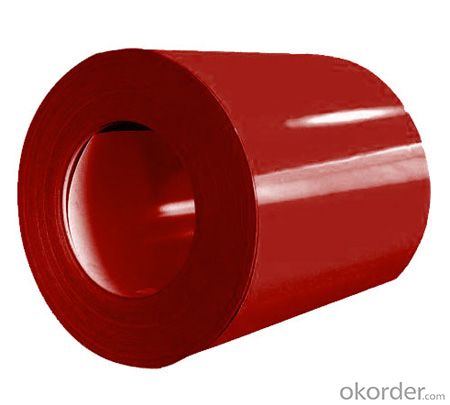
4.Prepainted Galvanized steel Coil Specification
Standard: ASTM, GB,JIS,JIS G3302 ASTM 755 EN10169
Grade: DX51D CGCC CS
Thickness: 0.2mm~1.2mm,
Width: 600-1250mm
Coil weight:3-12 MT
Coil ID:508/610mm
5.FAQ of Prepainted Galvanized steel Coil
We have organized several common questions for our clients,may help you sincerely:
1.How do you control your quality
We have established the international advanced quality management system,every link from raw material to final product we have strict quality test;We resolutely put an end to unqualified products flowing into the market. At the same time, we will provide necessary follow-up service assurance.
2.How long we will receive the goods ?
After receiving your deposit or workable lc ,our normal shipment date is 15-20days,and it takes around 28 days to reach your port of destination. But is up to different destination
3. What is your moq
Normally our moq is 25per size ,but it is up to different size
- Q: What are the different types of steel coil storage racks?
- There are several different types of steel coil storage racks, including coil cradles, coil saddles, coil racks, and coil c-hooks. Each type is designed to securely hold and store steel coils of various sizes and weights, providing easy access and efficient storage solutions for industrial facilities.
- Q: What are the different types of steel processing equipment for coils?
- There are several types of steel processing equipment used for coils, including slitting lines, cut-to-length lines, blanking lines, and coil-to-coil lines. Slitting lines are used to slit wide steel coils into narrower strips, while cut-to-length lines are used to cut coils into specific lengths. Blanking lines are used to cut shapes out of coils, and coil-to-coil lines are used to transfer coils from one processing stage to another.
- Q: steel structure
- Disadvantages Of Steel
- Q: How are steel coils cut and shaped for specific requirements?
- Steel coils are cut and shaped for specific requirements through a process called slitting and forming. Slitting involves unwinding the coil and passing it through a set of circular blades that cut it into narrower strips. These strips can then be further processed through different forming techniques such as roll forming, stamping, or bending to achieve the desired shape and dimensions. This allows manufacturers to customize steel coils according to specific requirements for various applications in industries like automotive, construction, and manufacturing.
- Q: How are steel coils used in the production of steel clips?
- Steel coils are used in the production of steel clips by being fed into a stamping machine, which cuts and shapes the coils into the desired size and shape of the clips.
- Q: is a 1962 steel penny worth anything?
- 1962 D Penny
- Q: i currently have just steel guitar strings, not a fan they need replacing and i was wondering whats the difference between steel and bronze strings and or nickle strings?
- Not all strings have a steel core. There are different substances used for the core on metal guitar strings (not even mentioning nylons), but the market is predominated by a steel core. The tonal properties of what steel strings are wound up by can make a great difference to the overall sound of an instrument. In general, nickel strings are bright but give off well-rounded frequencies and have properties that make them perfect for use with magnetic pickups, such as those used in electric guitars. Bronze-wound strings are a little mellower in timbre but give off more high-low (harmonically rich) frequencies and are favorites on acoustic steel-string guitars. Silk and steel-wound guitar strings are the mellowest sounding and give off more low-mid frequencies than the others. They are generally used for folky types of acoustic playing where little attack is needed. There are others but I won't mention them because you won't find them easily. There are other factors and merits of each type of string like how long they last - Nickel resists corrosion the most; bronze less so; bare steel oxidizes very easily. There is also the way the string is wound to take into account (flat-wound, etc. like the other answerer mentioned).
- Q: How are steel coils inspected for dimensional accuracy during processing?
- Steel coils are inspected for dimensional accuracy during processing through various methods such as measuring tape, calipers, laser scanners, or automated vision systems. These tools are used to measure the length, width, and thickness of the coils to ensure they meet the required specifications and tolerances.
- Q: What are the different types of steel coatings for coil protection?
- There are several different types of steel coatings for coil protection, including galvanized coatings, zinc-nickel coatings, organic coatings, and metallic coatings. Galvanized coatings involve applying a layer of zinc to the steel surface to protect it from corrosion. Zinc-nickel coatings offer enhanced corrosion resistance and improved adhesion properties compared to traditional galvanized coatings. Organic coatings, such as paint or polymer coatings, provide a protective barrier against corrosion and can also offer aesthetic benefits. Metallic coatings involve applying a thin layer of a different metal, such as aluminum or tin, to the steel surface to provide corrosion resistance.
- Q: Personally, I like Steel Cage matches to end in pinfalls. One of the biggest selling points of a Cage match is that it is to keep the competitors in and keep others out; essentially ensuring that it's a 1 on 1 match. As a result, I believe that pinfalls or submissions are important - but I know there's a lot of people that believe cage matches should only end in escape. What do you think??
- I don't really care either way. The only way I don't like it to end is when the door is opened and the person just walks out. That really isn't hard to win it like that. For last night I was hoping before the match that Bryan would win by escaping the cage. It fit his character, being a coward champ.
Send your message to us
Prepainted Galvanized Steel Coil Good Quality for Roofing-CGCC
- Loading Port:
- China main port
- Payment Terms:
- TT or LC
- Min Order Qty:
- 50 m.t.
- Supply Capability:
- 15000 m.t./month
OKorder Service Pledge
OKorder Financial Service
Similar products
Hot products
Hot Searches
Related keywords
